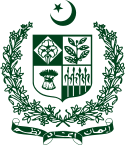
Ever since Pakistan became a sovereign state, the issue of human rights has been one of grave importance. The partition of India in the second half of 1947 saw one of the worst massacre, as thousands of individuals were slaughtered, made homeless, raped and abused in the process of migrating to the homeland of their choice. Governments on both sides of the newly drawn borders could not do much to prevent this; they were silent spectators to one of history’s most bloody moments.
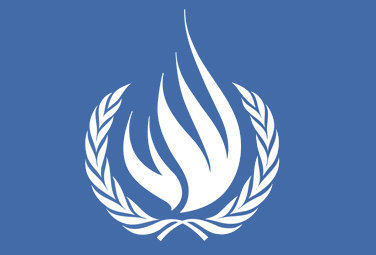
In 1948, when the Universal Declaration of Human Rights was presented in the United Nations General Assembly; Pakistan was among the 48 states that voted for the adoption of the Declaration. The Universal Declaration of Human Rights passed that year with 48 votes in favor, no votes against it and 8 abstentions. The declaration became an integral part of Pakistan’s constitutions, all three of them, and still is an integral part of the fundamental rights enshrined in, and guaranteed and safeguarded by the current constitution.
Pakistan, however has seen much ups and downs in its political arena. The Constitution, when first suspended by the first coup d’état, saw unlawful arrests, exiling of influential political figures, and unreasonable restrictions being imposed upon the citizens, as the Martial Law administrator General Ayub Khan said that he believed in “Democracy with Discipline” (there wasn’t any democracy, just the innocent civilians being disciplined along military lines). During the era of Gen. Yahya Khan, when East Pakistan, now Bangladesh was fighting for its independence and dismemberment of Pakistan, the Pakistan Army committed severe human rights violations, which may be classified as atrocities and war crimes. The army massacred many professors scientists and doctors in the East, and was accused of rape and torturing prisoners to death.
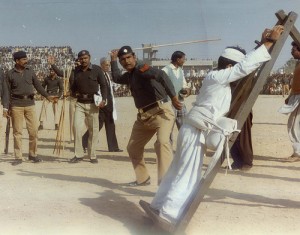
After Prime Minister Bhutto was ousted from office in another coup d’état, and General Zia-ul-Haq took over; the country saw its worst nightmare. The Constitution was ridiculously amended and new laws were promulgated in the process of ‘Islamization’. These new laws, aimed at legitimizing Zia regime, provided the administration far-reaching powers to suppress political activities. Public floggings became a common sight, political parties, trade unions, student unions, all were banned; those who dared to question Zia’s legitimacy or actions were tortured to death. The Hudood ordinances, provided for the punishments of victims of rape, and took away the rights of inheritance of women.
After Zia’s era, the Constitution was abrogated twice by Gen Musharraf, however this did not accompany large-scale human rights violation. Musharraf’s attempts to control the judiciary backfired, and the protests eventually lead to Musharraf leaving the country, and the presidency. The situation has improved greatly since. General elections were held in Pakistan in 2008, that saw the coming of a democratic government, which introduced the Constitution 18th Amendment act 2010, which reversed many of Zia-ul-Haq’s changes, and introduced articles, to safeguard the right of education and grant the right to a fair trial.

Judiciary and the Election Commission in Pakistan are now fiercely independent; this means that the right to a fair trial and right to participate in the country’s government for all Pakistanis are now secure. Much has still to be done; prisoners are still being tortured in jails, child molestation is still taking place in underdeveloped urban areas of Pakistan, according to UNICEF reports.
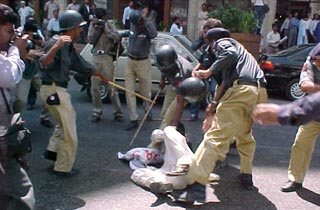
Pakistan, although has a democratic government, there are still incidents of human rights violation by the government. The Pakistani constitution, for example, guarantees the right to freedom of expression, subject to “reasonable restrictions imposed by law in order to protect the glory of Islam…”. This provision is being used as a tool to impose censorship on media and access to Internet. YouTube, the world’s most popular video sharing platform is not in Pakistan, just because a few videos insult Islam. This action of censorship, in my humble opinion, is violation of an individual’s freedom of speech, expression, choice and right to information as granted by the universal declaration of human rights and the constitution of the Islamic Republic of Pakistan and law.
The government has also failed to protect the right of life of its citizens; many people fall victims to target killing and terrorism each day. There have been instances of the law-enforcement agencies doing just that: in June 2011 the paramilitary forces shot dead an individual in a public park accused of armed robbery.
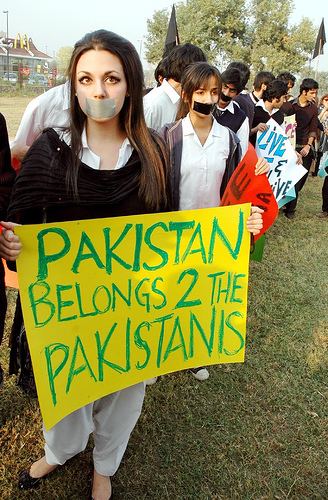
The situation of human rights abuse is improving in Pakistan, ever since the democratic forces have come to run the country. Pakistan, however has still a long way to go, before it transforms itself from a security state to a welfare state, which safeguards all the rights of its citizens without any discrimination of any kind whatsoever.
Read more about this issue:
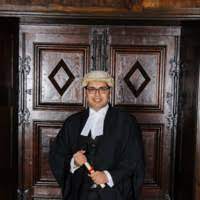
Leave a Reply